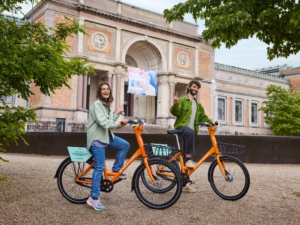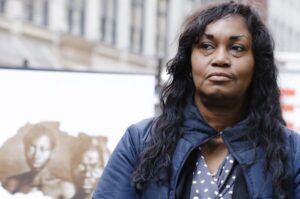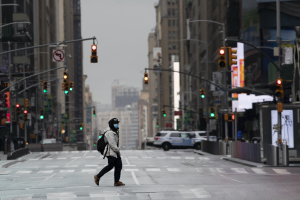Cities across the US have agreed to pay out a total of more than $80m in settlements to protesters injured by police during 2020 racial justice protests – a figure experts believe is unprecedented and will rise further as many lawsuits are still playing out.
The brutal murder of George Floyd by Minneapolis police officers on 25 May 2020 sparked the largest nationwide demonstrations since the civil rights era, as upwards of 26 million people gathered to protest racism and police brutality.
But, three years later, at least 19 US cities will pay more than $80m total to protesters who sustained various injuries as a result of law enforcement action, ranging from being teargassed to being shot with projectiles, and have filed dozens of civil lawsuits.
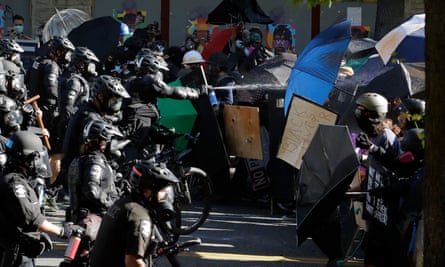
Justin Hansford, a professor at Howard University School of Law and executive director of the Thurgood Marshall Civil Rights Center, called the total number of settlements “unprecedented”.
“I have never seen a wave of settlements for police brutality like this in American history,” he said.
Thousands were traumatized, some were permanently injured and have sued successfully.
“You don’t recover from something like this. That’s not a thing you do,” said Linda Tirado, who was partially blinded after being fired on by the police while covering the protests that engulfed Minneapolis as a journalist.
Anthony Evans was shot in the jaw in Austin by police using so-called less-than-lethal ammunition during a Black Lives Matter protest in the Texas capital in 2020.
“We were never, like, cussing or yelling in their face or anything. It was all just peaceful,” Evans said.
Carol Sobel, a civil rights attorney in southern California, said that ongoing litigation in the US, which can take years to resolve, is expected to further boost the national payout total.
“As I see this now, when all of these cases are concluded, it will probably be a record amount, total, paid out across the country,” said Sobel, as well as a record number of settlements.
“That’s a consequence of the fact that the outrage of the killing of George Floydwas national and was represented nationally in a way that has never occurred before,” she said.
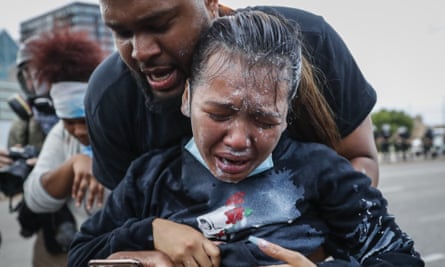
Other cities, including New York, Philadelphia, Denver, Atlanta, Los Angeles, Oakland, Milwaukee, Kansas City and Portland, Oregon, are among at least 19 to have agreed settlements so far and many more are being sued coast to coast, including San Jose and Washington DC.
“There are a lot of pending cases,” said Mara Verheyden-Hilliard, executive director of the Center for Protest Law and Litigation. “I think it’s reasonable to expect that numbers will eclipse past numbers,” she said.
Verheyden-Hilliard noted that mass settlements were paid out for police violence experienced during the Occupy Wall Street movement in 2011 and 2012 and for police using excessive force during anti-globalization protests in the early 2000s. Then came 2020.
“We had millions of people flowing into the street to stand against racist police violence. And in city after city and small town after small town, law enforcement was deployed to violently repress demonstrators,” Verheyden-Hilliard said.
It is unclear exactly how many people were injured by police while participating in protests that erupted after video emerged of a white police officer kneeling on Floyd’s neck during an attempted arrest, while Floyd repeatedly gasped that he couldn’t breathe.
Demonstrations spread across the country and then internationally, prompting a fresh reckoning in public life about systemic racism and the disproportionate killing of Black Americans by the police. Cities large and small have since paid out millions for injuries as heavily militarized police used rubber bullets, teargas and other weapons, and methods such as kettling, to corral and subdue or deter protesters.
Start the day with the top stories from the US, plus the day’s must-reads from across the GuardianPrivacy Notice: Newsletters may contain info about charities, online ads, and content funded by outside parties. For more information see our Privacy Policy. We use Google reCaptcha to protect our website and the Google Privacy Policy and Terms of Service apply.
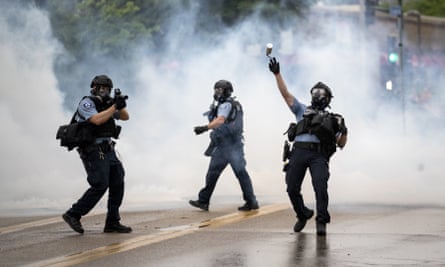
New York City and its police department (NYPD) will pay upwards of $6m to 320 protesters who were subject to excessive force – including being zip-tied, hit with batons and pepper-sprayed – during a June 2020 protest.
“The violence unleashed upon us that night was intentional, unwarranted, and will be with me for the rest of my life,” said Henry Wood, a plaintiff, in a March statement about the settlement.
“What the NYPD did, aided by the political powers of New York City, was an extreme abuse of power.”
The sum of $9.25m was paid to hundreds of Philadelphia protesters. La Mesa, California, awarded a local woman $10m after an officer shot her in the head with a projectile.
The payments, usually involving a lengthy legal process for victims, are conditional on cities and their respective police departments admitting no wrongdoing.
All the while, victims face life-changing injuries, trauma and other burdens.
Hansford noted that severe injuries like Tirado’s and Evans’ make up the majority of settlement cases, while many more never see redress.
Even people who do receive settlements face financial challenges, said Hansford. There can be high legal fees and medical debt, and settlements may not cover counseling or ongoing assistance.
“You’ll be lucky to break even in most cases if you don’t get damages,” said Hansford, referring to additional funds awarded for emotional harm.
Hansford added that, historically, litigation has done little to curb excessive force and police departments face no direct financial consequences.
“They’ll pay those dollars with the knowledge that it won’t really impact them,” said Hansford.
Individual officers are also largely spared from criminal charges.
Verheyden-Hilliard said that some settlements can get controversial police tactics banned. But she noted that police routinely find new ways to challenge reforms.
“It takes another wave of lawsuits to try and put constraints or dismantle the unlawful tactics that we see,” she said.
Since George Floyd’s murder, many more have criticized the US’s failure to address police brutality. The Minnesota congresswoman Ilhan Omar, in a Guardian interview earlier this month, criticized the lack of action and said the problem had only increased. And the UN has called on US officials to address police violence against Black people.
I hope you appreciated this article. Before you move on, I was hoping you would consider taking the step of supporting the Guardian’s journalism.
From Elon Musk to Rupert Murdoch, a small number of billionaire owners have a powerful hold on so much of the information that reaches the public about what’s happening in the world. The Guardian is different. We have no billionaire owner or shareholders to consider. Our journalism is produced to serve the public interest – not profit motives.
And we avoid the trap that befalls much US media – the tendency, born of a desire to please all sides, to engage in false equivalence in the name of neutrality. While fairness guides everything we do, we know there is a right and a wrong position in the fight against racism and for reproductive justice. When we report on issues like the climate crisis, we’re not afraid to name who is responsible. And as a global news organization, we’re able to provide a fresh, outsider perspective on US politics – one so often missing from the insular American media bubble.
Around the world, readers can access the Guardian’s paywall-free journalism because of our unique reader-supported model. That’s because of people like you. Our readers keep us independent, beholden to no outside influence and accessible to everyone – whether they can afford to pay for news, or not.
If you can, please consider supporting the Guardian today. Thank you.
Betsy Reed
Editor, Guardian US


